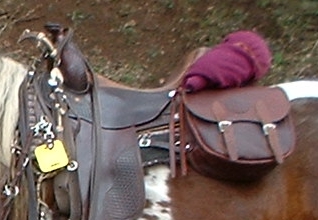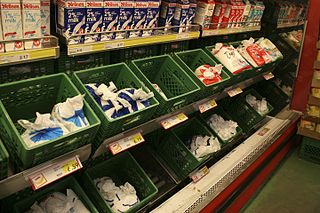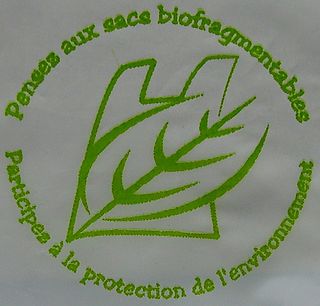Related Research Articles
Trek Bicycle Corporation is a bicycle and cycling product manufacturer and distributor under brand names Trek, Electra Bicycle Company, Bontrager, and Diamant Bikes. The company has previously manufactured bikes under the Gary Fisher, LeMond Racing Cycles, Klein, and Villiger Bikes brand names. With its headquarters in Waterloo, Wisconsin, Trek bicycles are marketed through 1,700 independently owned bicycle shops across North America, subsidiaries in Europe, Asia, South Africa, as well as distributors in 90 countries worldwide. Most Trek bicycles are manufactured outside the United States, in countries including the Netherlands, Germany, Taiwan, and China.

A handbag, commonly known as a purse in North American English, is a handled medium-to-large bag used to carry personal items.

Plastic shopping bags, carrier bags, or plastic grocery bags are a type of plastic bag used as shopping bags and made from various kinds of plastic. In use by consumers worldwide since the 1960s, these bags are sometimes called single-use bags, referring to carrying items from a store to a home. However, it is rare for bags to be worn out after single use and in the past some retailers incentivised customers to reuse 'single use' bags by offering loyalty points to those doing so. Even after they are no longer used for shopping reuse for storage or trash is common, and modern plastic shopping bags are increasingly recyclable or compostable. In recent decades, numerous countries have introduced legislation restricting the sale of plastic bags, in a bid to reduce littering and plastic pollution.

A plastic bag, poly bag, or pouch is a type of container made of thin, flexible, plastic film, nonwoven fabric, or plastic textile. Plastic bags are used for containing and transporting goods such as foods, produce, powders, ice, magazines, chemicals, and waste. It is a common form of packaging.

A bin bag, rubbish bag, garbage bag, bin liner, trash bag or refuse sack is a disposable bag used to contain solid waste. Such bags are useful to line the insides of waste containers to prevent the insides of the receptacle from becoming coated in waste material. Most bags today are made out of plastic, and are typically black, white, or green in color.

A messenger bag is a type of sack, usually made of cloth. It is worn over one shoulder with a strap that goes across the chest resting the bag on the lower back. While messenger bags are sometimes used by couriers, they are now also an urban fashion icon. Some types of messenger bags are called carryalls. A smaller version is often called a sling bag.

Timbuk2 is a San Francisco-based bag manufacturer and marketer. The company produces a variety of pre-made and made-to-order bags. Timbuk2 is owned by private equity group TB2 Investors. In 2014, the company was ranked as the 2nd largest manufacturer in San Francisco by the San Francisco Business Times.

Reuse is the action or practice of using an item, whether for its original purpose or to fulfill a different function. It should be distinguished from recycling, which is the breaking down of used items to make raw materials for the manufacture of new products. Reuse – by taking, but not reprocessing, previously used items – helps save time, money, energy and resources. In broader economic terms, it can make quality products available to people and organizations with limited means, while generating jobs and business activity that contribute to the economy.

Saddlebags are bags that are attached to saddles.

TerraCycle is a private U.S.-based recycling business headquartered in Trenton, New Jersey. It primarily runs a volunteer-based recycling platform to collect non-recyclable pre-consumer and post-consumer waste on behalf of corporate donors or municipalities to turn it into raw material to be used in new products. TerraCycle also manages Loop, a consumer-products shopping service with reusable packaging.

Upcycling, also known as creative reuse, is the process of transforming by-products, waste materials, useless, or unwanted products into new materials or products perceived to be of greater quality, such as artistic value or environmental value.

A milk bag is a plastic bag that contains milk. Usually one of the corners is cut off to allow for pouring, and the bag is stored in a pitcher or jug.

English Retreads was an eco-fashion company that made handbags and accessories from recycled materials. The company was known for its products that are all low environmental impact, vegan, and handcrafted in Boulder, Colorado. English Retreads offered handbags, wallets, belts, laptop bags and key chains all made from recycled materials, primarily reclaimed rubber and recycled PETE material.

Dunnage bags, also known as airbags, and inflatable bags, are used to secure and stabilize cargo.

Biodegradable bags are bags that are capable of being decomposed by bacteria or other living organisms.
Looptworks is a Portland, Oregon business that upcycles or re-purposes abandoned, pre-consumer and post-consumer materials into limited-edition products. By re-using the world's pre-consumer excess, the U.S.-based company aims to "break the cycle of waste". The products created by Looptworks primarily focus on bags, accessories and clothing.

Novara, was the private label brand of bicycles, apparel and bicycle accessories, that was exclusively available through the consumer cooperative REI. The brand was introduced in 1983 and was headquartered in Kent, Washington. Novara bikes are designed in house; outsourced for manufacturing, then finished by REI.

Chrome Industries is a global manufacturer of messenger bags, backpacks, sling Bags, travel Bags, utility cycling apparel and utility cycling footwear geared specifically for the bike messenger and fixed gear scenes. After establishing a reputation in Boulder, Colorado in 1995, Chrome moved to Denver for several years before relocating in 2002 to San Francisco. In June 2017, the company moved its headquarters to Portland, Oregon. In August 2010, Chrome opened its second retail store in Manhattan, New York, and had retail locations in Chicago, Portland, Seattle, Minneapolis, a second San Francisco location in the Mission District, Denver, Brooklyn, and Washington, DC. Due to COVID-19 they closed all of their retail stores permanently.

Ortlieb Sportartikel GmbH is a German manufacturer of outdoor equipment based in Heilsbronn, Germany, which specializes in waterproof bags. Ortlieb is a leading manufacturer of waterproof panniers for bicycles.
Lezyne is a manufacturer of bicycle accessories headquartered in Reno, Nevada, with offices in San Luis Obispo, Berlin and Taichung. The company is known for producing pumps, multi-tools, saddle bags, bottle cages, lights and GPS cyclocomputers. Most of their products are manufactured in-house at their factory in Taichung, Taiwan. In addition to selling products in the aftermarket, Lezyne is an original equipment manufacturer for electric bicycle lights.
References
- ↑ Bloomekatz, Ari (June 28, 2013). "Trek and REI Join Forces with Alchemy Goods to Grow Nationwide Bike Tube Recycling Network". Business Wire .
- ↑ Costley-White, James (December 15, 2010). "Alchemy Goods (Ag) cycling bags – First look". bikeradar.com.
- ↑ Bloomekatz, Ari (January 3, 2006). "Useless turns useful with Alchemy". The Seattle Times .
- ↑ Perman, Stacy (August 16, 2006). "From Garbage to Gold". Bloomberg Businessweek .
- ↑ Brones, Anna (June 30, 2009). "Golden Garbage: Alchemy Goods Leads the Way for Transforming Useless into Useful". Wend Magazine. Archived from the original on May 20, 2012.